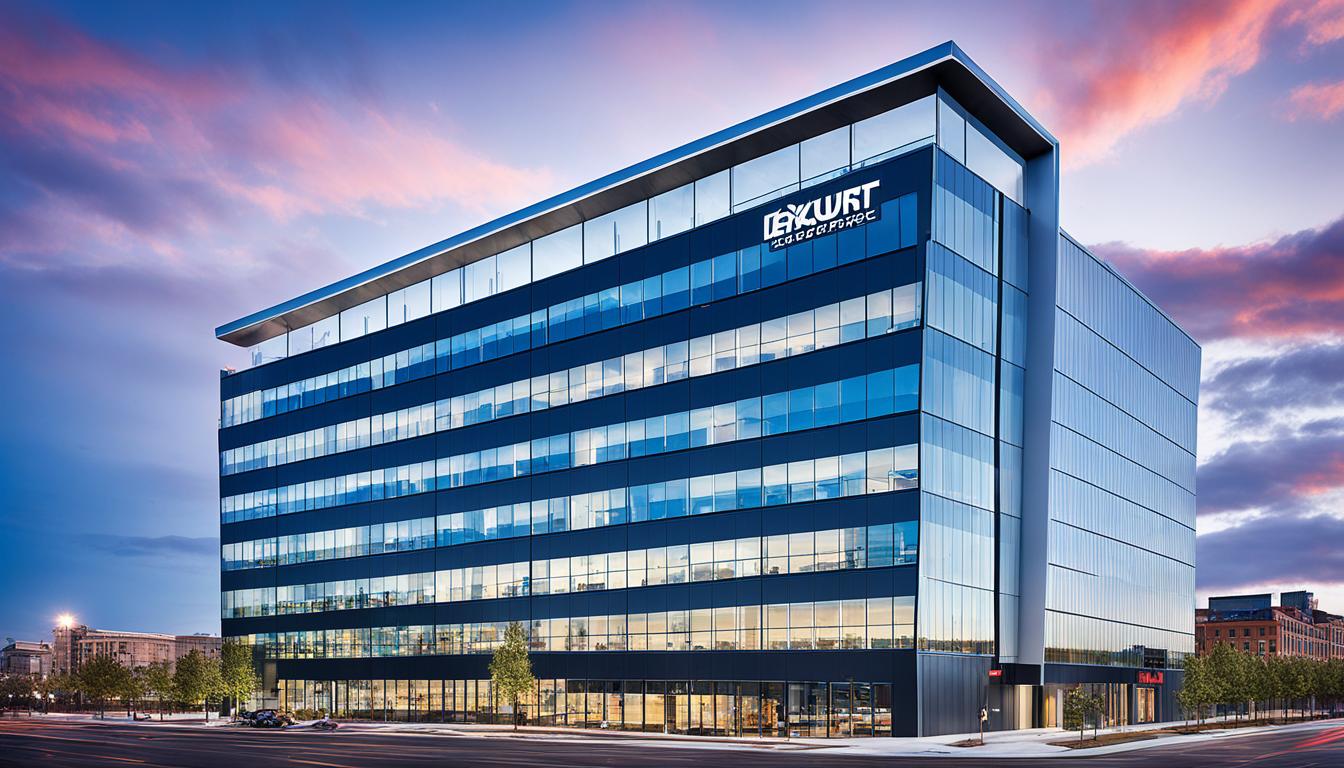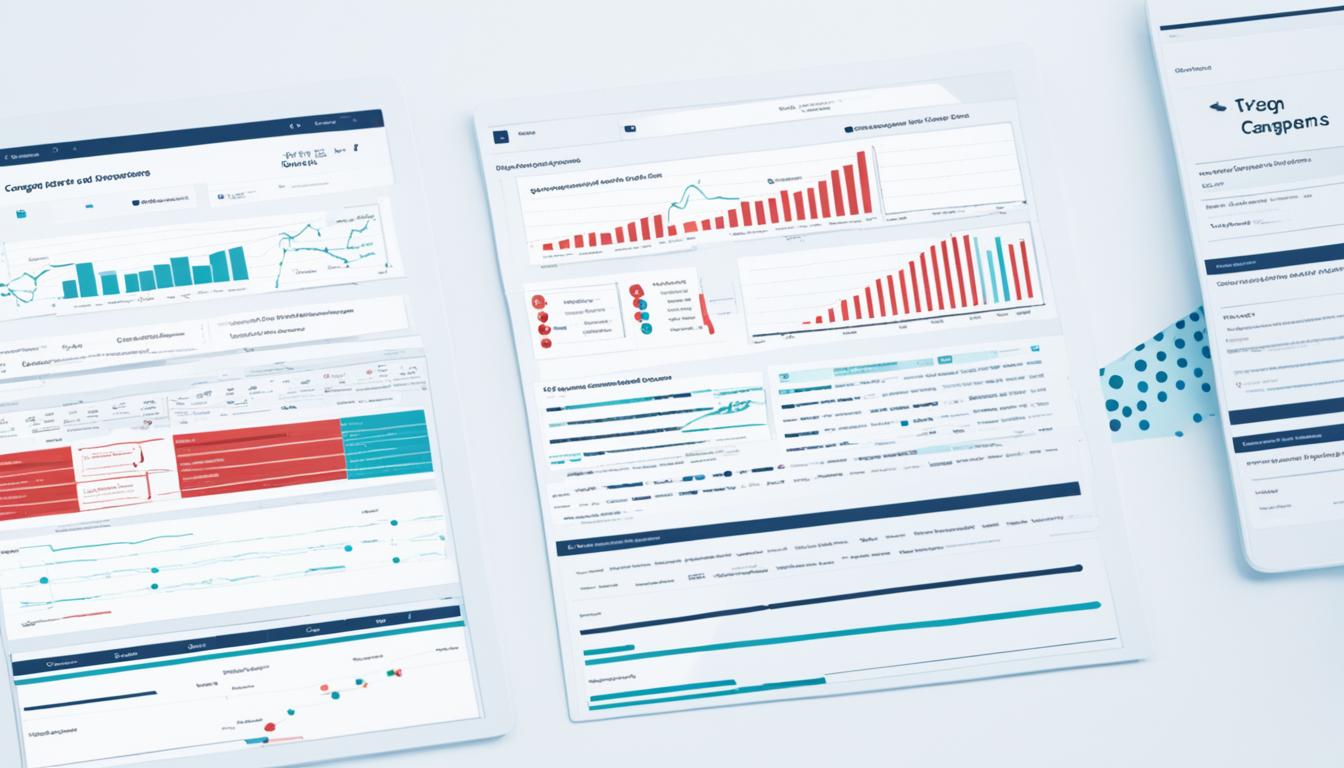Developing an effective boutique hotel marketing strategy is crucial in the competitive hospitality industry. This comprehensive guide will provide insights and strategies to elevate your brand and enhance the guest experience. With a focus on luxury hospitality branding, experiential travel marketing, niche hotel promotion, personalized guest experiences, influencer collaborations, social media campaigns, local partnerships, and sustainable tourism initiatives, this guide will help you drive bookings and stand out in the market.
Key Takeaways:
- Implementing a comprehensive boutique hotel marketing strategy is essential for success in the competitive hospitality industry.
- Luxury hospitality branding can differentiate your hotel and attract discerning guests.
- Experiential travel marketing focuses on creating unique and memorable experiences for your guests.
- Niche hotel promotion allows you to target specific audiences and stand out in the market.
- Personalized guest experiences create a sense of exclusivity and foster loyalty.
The Importance of a Hotel Marketing Plan in 2024
In the aftermath of the COVID-19 pandemic, the hospitality industry is still recovering and hoteliers are adapting their marketing strategies to meet the evolving needs of travelers. A well-designed hotel marketing plan is essential for growth and innovation. This section will explore the importance of staying updated on seasonal trends and market trends, adapting to the new normal, and implementing innovative marketing ideas to attract and retain guests.
As hotels continue their recovery from COVID-19, it is crucial to have a comprehensive marketing plan in place to navigate the changing landscape. By keeping up with seasonal trends, hoteliers can align their offerings with the preferences of their target audience throughout the year. Whether it’s adjusting promotional strategies for holidays or capitalizing on popular activities during specific seasons, understanding seasonal trends allows hotels to stay relevant and capture the attention of potential guests.
Additionally, staying informed about market trends is essential for crafting a successful marketing plan. By monitoring industry reports, consumer behavior, and competitor strategies, hotels can adapt to emerging trends and capitalize on new opportunities. For example, with the continued rise of sustainable and eco-friendly travel, hotels can incorporate environmentally conscious practices into their marketing messaging and operations to attract environmentally conscious travelers.
Furthermore, a hotel marketing plan that focuses on innovation is key to standing out in a crowded market. In an era of experiential travel and personalized guest experiences, hotels need to think beyond traditional marketing approaches. By implementing innovative ideas such as interactive digital campaigns, immersive storytelling, or unique partnerships with local attractions or influencers, hotels can create memorable experiences that resonate with guests and differentiate themselves from competitors.
Overall, in the evolving landscape of the hospitality industry, a well-crafted hotel marketing plan serves as a roadmap for success. It enables hotels to adapt to seasonal trends and market trends, capture the attention of potential guests, and stand out in a competitive market. By staying updated on industry shifts, embracing innovation, and providing unique experiences, hotels can drive bookings and thrive in 2024.
Crafting a Compelling Value Proposition
A compelling value proposition is the foundation of a successful hotel marketing strategy. It is a concise and clear statement that communicates the unique experiences and benefits guests can expect from choosing your hotel. By understanding the needs and desires of your target audience, you can create a value proposition that resonates with potential guests and differentiates your hotel from competitors.
When crafting your value proposition, it is crucial to identify and emphasize your hotel’s unique selling points. What sets your property apart? Is it the breathtaking views, the personalized service, or the innovative amenities? Highlighting these key features will help you create a powerful marketing message that appeals to your target audience.
Understanding Your Target Audience
A strong value proposition starts with a deep understanding of your target audience. Conduct market research, analyze guest feedback, and identify the demographics, preferences, and pain points of your ideal guests. This knowledge will enable you to tailor your marketing message to their specific needs and desires.
Consider the following questions:
- What are the primary motivations for travelers in your target market?
- What are the key factors that influence their decision-making process?
- What are their preferred travel experiences and accommodations?
By answering these questions, you can create a value proposition that resonates with your ideal guests and communicates the unique benefits they will receive by choosing your hotel.
Upselling, Cross-Selling, and Engagement
A compelling value proposition not only attracts guests but also enhances upselling, cross-selling, and engagement opportunities.
Upselling involves offering guests an upgrade or additional services that provide additional value. For example, if your hotel has luxurious suites or special amenities, you can highlight these benefits in your value proposition, increasing the likelihood that guests will choose a higher-tier room.
Cross-selling, on the other hand, involves offering complementary services or experiences to guests. For instance, if your hotel has a spa or a fine dining restaurant, you can include these offerings in your value proposition, encouraging guests to explore and indulge in additional experiences during their stay.
Engagement is crucial in building relationships with guests and turning them into loyal advocates of your hotel. By clearly communicating the unique experiences and benefits your hotel offers, you can create a sense of excitement and anticipation for their stay. Engage with guests before, during, and after their visit to provide personalized recommendations, exclusive offers, and exceptional service.
To summarize, a compelling value proposition is essential for driving bookings and standing out in the competitive hospitality industry. By understanding your target audience and highlighting your hotel’s unique selling points, you can create a marketing message that resonates with potential guests. This will not only attract customers but also enhance upselling, cross-selling, and engagement opportunities, leading to long-term success for your boutique hotel.
Identifying and Targeting Your Audience
To effectively market your boutique hotel, understanding and targeting your audience is key. By implementing personalized marketing strategies and tailoring your messaging to specific demographics, you can create impactful campaigns that resonate with potential guests and drive bookings.
Demographic targeting allows you to focus your efforts on specific groups of people who are more likely to be interested in your hotel’s offerings. By analyzing data such as age, gender, location, and interests, you can gain valuable insights into your target audience’s preferences and behaviors. This information enables you to craft custom-tailored marketing messages that speak directly to their needs and desires.
Importance of Personalized Marketing
Personalized marketing is a powerful tool for creating meaningful connections with your target audience. By delivering relevant content and offers based on their preferences and past interactions with your brand, you can enhance their experience and increase the likelihood of conversion.
By segmenting your audience into smaller, more targeted groups, you can create personalized campaigns that address their specific needs and pain points. For example, if your hotel offers family-friendly amenities and services, you can develop marketing materials that highlight these features for families with children. Similarly, if your hotel caters to luxury travelers, you can tailor your messaging to convey exclusivity and sophistication.
Demographic Targeting
Demographic targeting allows you to reach the right people with your marketing efforts. By understanding the characteristics and preferences of different demographic segments, you can allocate your resources effectively and maximize your ROI.
For instance, if you’re targeting millennials, you might focus your marketing efforts on social media channels such as Instagram and TikTok. These platforms are popular among this demographic and provide opportunities to engage with potential guests through visually appealing content and influencer collaborations.
Conversely, if you’re targeting business travelers, you might consider leveraging LinkedIn or industry-specific publications to reach this audience. By understanding the platforms and media channels preferred by your target demographic, you can ensure that your message reaches the right people at the right time.
By harnessing the power of personalized marketing and demographic targeting, you can create compelling and relevant campaigns that resonate with your audience. Understanding their preferences and behaviors allows you to tailor your messaging, elevate your brand, and drive bookings.
Strategic Budgeting for Hotel Marketing
Establishing a strategic budget is a fundamental component of an effective hotel marketing strategy. By thoughtfully allocating your marketing budget, you can maximize your return on investment and drive desired outcomes. In this section, we will provide expert guidance on estimating your marketing budget, identifying and understanding your operating costs, and leveraging strategic planning to optimize your marketing efforts.
Estimating Your Marketing Budget
When it comes to setting your marketing budget, it is crucial to consider various factors that contribute to the success of your campaigns. By taking into account your marketing goals, target audience, and competitive landscape, you can determine the appropriate investment to achieve your desired outcomes. Additionally, conducting market research and analyzing historical data can provide valuable insights into industry benchmarks and enable you to allocate your budget effectively.
Identifying and Understanding Operating Costs
Operating costs play a significant role in shaping your hotel marketing budget. Understanding these costs and accounting for them will help you make informed decisions about which marketing initiatives to prioritize. Consider expenses such as marketing staff salaries, software subscriptions, website maintenance, and advertising fees when estimating your budget. By carefully evaluating your operating costs, you can ensure that your marketing efforts align with your overall financial goals.
Leveraging Strategic Planning for Optimal Results
Strategic planning is crucial for optimizing your marketing budget and ensuring that your investments generate the desired outcomes. Start by clearly defining your goals and objectives, and then develop a detailed marketing plan that outlines the tactics and channels you will utilize to achieve them. Regularly evaluate your marketing campaigns, track performance metrics, and make data-driven adjustments to ensure that you stay on track and maximize the impact of your budget.
By strategically budgeting for your hotel marketing efforts and considering factors such as marketing budget, operating costs, and strategic planning, you can effectively allocate your resources and drive success. The next section will delve into selecting the right marketing channels to reach your target audience and maximize your hotel’s visibility.
Choosing the Right Marketing Channels
When it comes to reaching your target audience effectively, selecting the right marketing channels is paramount. Analyzing your current performance and understanding your audience’s preferences play a crucial role in making this decision. Additionally, staying updated on changing trends in hotel marketing allows you to adapt your strategies and invest in platforms that will generate the most impact for your hotel.
With the evolving landscape of marketing channels and online platforms, it’s essential to evaluate which platforms align with your brand’s goals and resonate with your target audience. It’s not just about being present on every platform; it’s about strategically choosing the ones that will yield the best results.
One approach is to conduct market research to identify where your audience spends their time online. This will help you narrow down your options and focus on the platforms that have higher engagement rates among your target demographic.
Key Considerations for Choosing Marketing Channels
- Demographics: Understanding the demographics of your target audience is crucial in determining the appropriate marketing channels. Different platforms have varying user demographics, and aligning your strategy with your audience’s preferred platforms increases the likelihood of capturing their attention.
- Engagement Metrics: Evaluating engagement metrics is essential to assess the performance of various platforms. Look for metrics such as click-through rates, conversion rates, and social media engagement. These insights will help you identify which channels are most effective in driving traffic and conversions.
- Competitor Analysis: Keeping an eye on your competition can provide valuable insights into which marketing channels are working well for similar businesses. Analyze their online presence and examine the platforms they utilize to gauge their success.
- Changing Trends: The digital marketing landscape is constantly evolving. Stay updated on the latest trends and advancements in hotel marketing to identify emerging platforms and capitalize on new opportunities. This will enable you to stay ahead of the curve and reach your audience in innovative ways.
By carefully considering these factors and conducting thorough research, you can choose the marketing channels and online platforms that offer the greatest potential for reaching your target audience effectively.
Remember, the goal is not to be present on every platform but rather to focus on the channels that align with your brand identity and resonate with your audience. Investing your time, resources, and energy into the right marketing channels will help you maximize your reach, engagement, and ultimately, the success of your boutique hotel.
Optimizing for the Mobile Experience
With the increasing number of travelers using mobile devices to research and book hotel rooms, it is imperative for boutique hotels to prioritize mobile optimization for their websites and marketing strategies. Providing a seamless mobile experience is key to attracting and retaining guests in today’s digital landscape.
Mobile-Friendly Website Design
One of the essential aspects of mobile optimization is having a mobile-friendly website design. A mobile-friendly website ensures that your content is accessible and visually appealing on smartphones and tablets. Responsive design allows your website to adapt to different screen sizes, ensuring a consistent and user-friendly experience for mobile users. By optimizing your website for mobile devices, you can improve user engagement and increase bookings.
Mobile-Friendly Content
In addition to a mobile-friendly website design, optimizing your content for mobile devices is crucial. Mobile users have shorter attention spans, so it is essential to deliver concise and easily readable content. Use shorter paragraphs, bullet points, and headers to break up the text and make it easier to digest on mobile screens. Including high-quality visuals and multimedia elements that load quickly on mobile devices can also enhance the user experience.
Optimized Email Campaigns
Email marketing remains a powerful tool in the hospitality industry, and optimizing your email campaigns for mobile devices is essential. Mobile users frequently check their emails on smartphones, so it’s important to ensure that your emails are mobile-friendly. Use responsive email templates that adapt to mobile screens and test your emails across different devices and email clients to ensure they display correctly. Including clear call-to-action buttons and concise content in your emails can encourage mobile users to take action and make a reservation.
Mobile Booking
Mobile booking capabilities are a must-have for boutique hotels in today’s mobile-first era. Implementing a seamless mobile booking process allows guests to make reservations conveniently on their smartphones. Ensure that your booking platform is optimized for mobile devices, with a simple and intuitive interface. By offering a mobile booking option, you can capture potential guests who prefer the convenience of booking on the go.
| Advantages of Mobile Optimization | Benefits |
|---|---|
| Improved user experience | Enhanced guest satisfaction and engagement |
| Increased mobile bookings | Higher conversion rates and revenue |
| Competitive advantage | Stand out from competitors and attract more guests |
| Expanded reach | Tap into the growing number of mobile users |
By optimizing your boutique hotel’s mobile experience, including responsive website design, mobile-friendly content, optimized email campaigns, and mobile booking capabilities, you can cater to the needs of mobile users and enhance their overall guest experience. Embracing mobile optimization not only improves user engagement and conversions but also positions your hotel for success in an increasingly mobile-centric world.
Leveraging Technology for Guest Engagement
As the hospitality industry evolves, technology has become a key driver in enhancing guest engagement and satisfaction. By leveraging advanced tools and services, boutique hotels can create a personalized and seamless guest experience that sets them apart from the competition.
Live Chat Service: Real-Time Support for Guests
One powerful technology that has revolutionized guest communication is live chat service. With a live chat feature on your hotel’s website, guests can receive immediate assistance and answers to their inquiries. This real-time support improves the booking experience and helps guests make informed decisions.
By integrating a live chat service into your hotel’s website, you can provide 24/7 support to potential and current guests. Whether it’s answering questions about room availability, providing information about amenities, or addressing specific requests, live chat allows for quick and efficient communication.
Implementing live chat service not only enhances guest satisfaction but also increases the likelihood of direct bookings. By offering personalized assistance and addressing concerns in real-time, you can build trust with your guests and guide them towards making a reservation.
AI-Powered Chatbots: Intelligent Guest Assistance
In addition to live chat services, AI-powered chatbots are another technological innovation that can significantly improve guest engagement. Chatbots are capable of handling a wide range of guest inquiries, providing instant responses and offering personalized recommendations.
AI-powered chatbots can automate routine tasks such as answering frequently asked questions, providing directions, or suggesting local attractions. This eliminates the need for guests to wait for a response and allows hotel staff to focus on more complex guest needs.
Chatbots can also integrate with your hotel’s booking system, enabling guests to check availability, make reservations, and receive confirmation details directly through the chat interface. This seamless booking experience enhances convenience and encourages direct bookings.
Managing Online Reviews: Building Trust and Reputation
In today’s digital landscape, online reviews play a crucial role in shaping a hotel’s reputation. Managing online reviews effectively is vital for building trust with potential guests and attracting new bookings.
Implementing a comprehensive online review management strategy involves monitoring review platforms, responding to guest feedback promptly, and addressing any concerns or issues raised by guests. By actively engaging with reviews, you can demonstrate your commitment to guest satisfaction and showcase your responsiveness as a hotel.
Encouraging guests to leave reviews after their stay is also important. Positive reviews provide social proof and can influence other potential guests considering your hotel. Offering incentives, such as discounts or loyalty program rewards, can motivate guests to share their experiences and generate user-generated content.
Embracing User-Generated Content: Amplifying Brand Advocacy
User-generated content (UGC) is a powerful resource that can amplify your hotel’s brand advocacy. UGC includes photos, videos, and testimonials created by guests who have experienced your hotel firsthand.
Encouraging guests to share their experiences on social media platforms and tagging your hotel’s official accounts allows you to showcase authentic content and engage with potential guests. UGC acts as social proof, demonstrating real guest experiences and building trust in your brand.
One effective way to encourage UGC is by hosting social media contests or giveaways. By incentivizing guests to share their photos or stories with a designated hashtag, you can increase engagement and generate a wealth of UGC. This content can then be shared across your hotel’s marketing channels, showcasing the genuine experiences of satisfied guests.
By leveraging technology, including live chat services, AI-powered chatbots, managing online reviews, and embracing user-generated content, boutique hotels can create a guest-centric experience that fosters engagement, drives bookings, and builds a positive reputation in the competitive hospitality industry.
Conclusion
Crafting a successful boutique hotel marketing strategy requires a comprehensive approach that incorporates luxury hospitality branding, experiential travel marketing, niche hotel promotion, personalized guest experiences, influencer collaborations, social media campaigns, local partnerships, and sustainable tourism initiatives. By following the principles outlined in this guide and staying updated on market trends, hoteliers can drive bookings, elevate their brand, and create memorable guest experiences.
Implementing a well-rounded marketing plan will enable boutique hotels to stand out in the industry and thrive in 2024. By leveraging the power of personalized guest experiences and strategic collaborations, hotels can elevate their brand and create a unique value proposition that resonates with their target audience.
In an increasingly competitive market, it is essential for boutique hotels to embrace innovative strategies such as influencer collaborations and social media campaigns. These approaches can help hotels engage with their target audience effectively and attract new bookings. By also focusing on local partnerships and sustainable tourism initiatives, hotels can establish themselves as responsible brands that provide authentic experiences while contributing to the local community.
With the right marketing strategy, boutique hotels can differentiate themselves from the competition and create a lasting impression on their guests. By implementing the insights provided in this guide and continuously adapting to changing trends, hoteliers can drive bookings, elevate their brand, provide exceptional guest experiences, and ultimately stand out in the industry.





